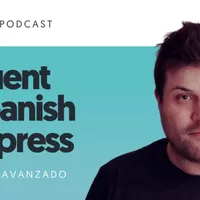316. Significado y origen de TIRAR LOS TEJOS
Esto es Fluent Spanish Express, un podcast para aprender todo el español que no te enseñan los libros. ¡Comenzamos! Muy buenos días. Bienvenidos, bienvenidas a Fluent Spanish Express Podcast. Todos los días de lunes a viernes, contenidos con consejos, con recursos y recomendaciones, como siempre digo, para llevar vuestro español al siguiente nivel. Hoy es jueves 8 de diciembre de 2022, Día de la Inmaculada Concepción aquí en España. Episodio número 316 de Fluent Spanish Express Podcast, un episodio de hoy en el que voy a hablaros de una expresión que se utiliza de manera coloquial y que es nada más y nada menos que tirar los tejos. Hoy os voy a hablar del significado, del origen de esta peculiar expresión, tirar los tejos. Pero antes de eso, me presento como siempre. Mi nombre es Diego Villanueva, profesor de español online y creador de esto que estáis escuchando, de Fluent Spanish Express. Y además también creador de la newsletter diaria de lunes a viernes, como este podcast, SpanishNewsletter.com. Allí todos los días de lunes a viernes, contenidos para practicar, para mejorar vuestro español. Así que cinco minutos este podcast, cinco minutos la newsletter y ya tenéis hecho vuestro día de español. Además, os recuerdo que podéis apoyar este podcast con una donación. Os dejo el enlace para hacer la donación en la descripción de este podcast. Desde aquí, muchas gracias a las personas que habéis donado hasta ahora y además, a cambio, pues también yo os ofrezco las transcripciones del podcast. Así que si queréis leerlas, tener las transcripciones en vuestro correo electrónico de este podcast, pues simplemente hacéis una donación y os llegarán para que podáis practicar, para que podáis ver si entendéis todo lo que digo en este podcast, porque ya veis que hablo bastante rápido. Bueno, hablo como hablamos los españoles. Y bueno, pues que tengáis las transcripciones para poder trabajar. Así que dicho esto, vamos a empezar ya con este episodio que va a ser cortito. Simplemente os voy a contar el significado y el origen de tirar los tejos. Bueno, el origen de esta expresión, esta expresión de tirar los tejos, es bastante os antiguo, porque viene de un antiguo juego que se llama el tejo. El tejo consistía en tirar una piedra o un trozo de teja, estas que están en los tejados, que normalmente había caído algún tejado y se cogía una teja de esas, contra un palo de madera que está clavado o puesto en el suelo. Y el objetivo, obviamente, era derribarlo. Se clavaba un palo en el suelo, se tiraba una teja contra el palo y el objetivo era derribarlo. Quien lo derribaba, ganaba. Bueno, pues normalmente a este juego se jugaba en las plazas o en lugares públicos. Y mientras que estaban jugando, pues había otras personas que estaban sentadas en un banco o que estaban por ahí paseando. Y era bastante habitual que algún chico, al que le gustaba alguna chica y que pasaba por allí, pues tirase el tejo a una distancia que estaba, pues, o a un sitio donde estaba esa persona para intentar, con la excusa de ir a recogerlo, pues aprovechar para hablar, para charlar, para empezar a, digamos, tener un poco de contacto con esa persona. O como excusa, como manera de romper el hielo para ir allí directamente a hablar. Entonces, a partir de esta práctica, digamos que un poco, pues, no sé cómo decir, pero una práctica con unas intenciones que no eran ni mucho menos las de jugar a este juego, sino la intención de ligar, pues se popularizó esta expresión de tirar los tejos. Luego, más adelante, con el paso de los años, fueron adaptándose y en algunos casos también se utiliza tirar los trastos. Los trastos son cosas que nos sirven, cosas inútiles. Pues tirar los trastos es como la misma idea de esto. Tirar la caña también. La caña, ya sabéis, que se utiliza para pescar, por ejemplo, pues tirar la caña como una especie de metáfora entre pescar a una persona, ligar con una persona, o también tirar fichas, que es muy parecido a tirar los tejos. Así que esta expresión, tirar los tejos, como os digo, origen de un antiguo juego que se llamaba El Tejo, y que consistía en tirar una teja contra un palo para derribarlo, pero que se utilizaba para tirar la teja cerca de una persona que te gustaba y que, pues, ibas allí a hablar, a intentar hablar con esa persona para ligar. Así que espero que os haya gustado esta historia. Tirar, ya sabéis, tirar los tejos, tirar los trastos, tirar la caña, tirar fichas, diferentes maneras que tendremos en español de decir que estamos ligando. Espero que os haya gustado este episodio. Como siempre, os invito a que apoyéis el podcast con una donación. Os dejo en la descripción del enlace, el enlace en la descripción del podcast, madre mía. Y sin más, me despido hasta mañana. Que tengáis muy buen jueves. Adiós.

